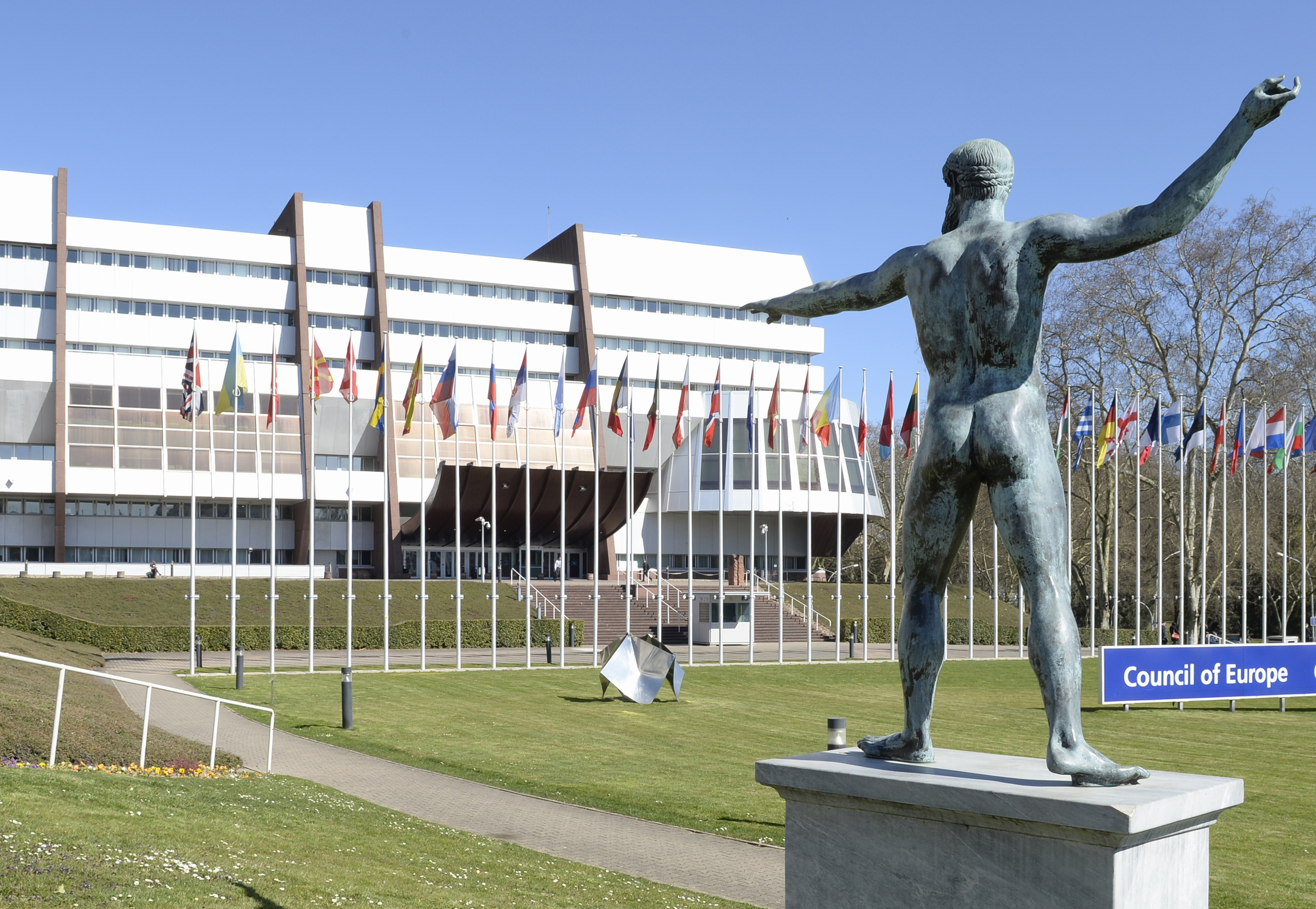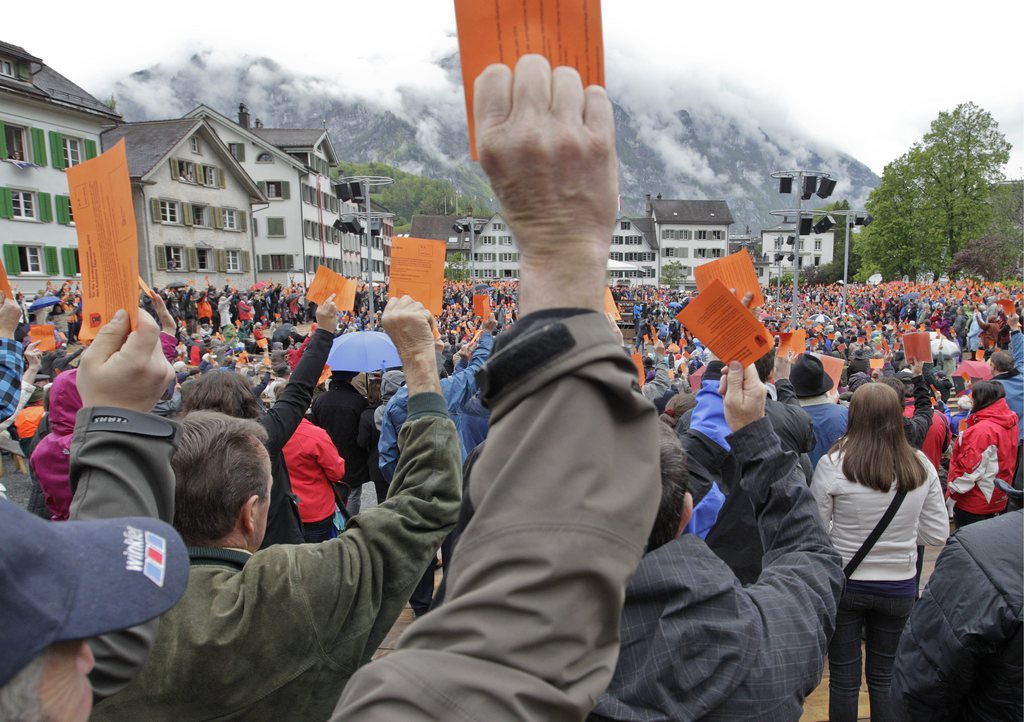ECHR under pressure on Swiss anniversary

The Swiss are celebrating the 40th anniversary of the ratification of the European Convention on Human Rights (ECHR), but not everyone is joining the party. The landmark treaty and its Strasbourg-based courtExternal link are under attack, most notably from the rightwing Swiss People’s Party.
On November 28, 1974, Switzerland finally ratified the ECHRExternal link. To mark the ruby anniversary, the Swiss government released a 72-page reportExternal link earlier this month examining the past 40 years, ongoing reforms and future perspectives.
In it, the government resolutely defends the ECHR, the “cornerstone of fundamental European values”.
“Signing up to the convention 40 years ago influenced and strengthened the rule of law in Switzerland….the ECHR has become a reference for parliaments and federal and cantonal courts… it is important to maintain this exterior view on the Swiss legal system,” the report stated.
“Denouncing the convention is not an option,” it went on.
This sentence jumps off the page pointing to current tensions. The ECHR and certain rulings by Strasbourg, especially those regarding foreigners and asylum, have come in for a bruising time lately.
A court decision in early November demanding Switzerland not to send vulnerable asylum seekers back to Italy without individual guarantees over their care raised hackles.
Critics are led by the People’s PartyExternal link, which is in the final stages of drawing up an initiative intended to ensure Swiss law’s precedence over international law.
Some would like to go further. The day after the government report was released the NZZ newspaper reported Defence Minister Ueli Maurer – a People’s Party member – had proposed during a cabinet meeting that Switzerland leave the ECHR.
Walter Kälin, an international law specialist and director of the Swiss Centre of Expertise in Human Rights (SCHR)External link, said this was a “serious and dangerous” development, which was also being discussed in Britain and Russia.
“If Switzerland and Britain left the convention this would not be the end of human rights in these two countries, as they have very strong human rights cultures, but it would be the excuse for many states that don’t have that domestic culture. This would be a huge step backwards,” he declared.
Few cases
While critics give the impression Switzerland has a rough time in Strasbourg, the statistics tell a slightly different story. Switzerland remains a minor actor. Since 1974, around 6,000 Swiss-related cases were filed, but of these only 3% went to court and 1.6% resulted in judgements.
The vast majority are deemed inadmissible mainly due to the lack of legal basis or the case having been resolved in the Swiss courts.
As in most member states, Strasbourg rulings are not welcomed with open arms. But certain Swiss decisions – such as Belilos (court access), Burghartz (right to add wife’s surname) and Jutta Huber (impartiality of detaining authority) – which initially caused controversy have led to important changes in the legal landscape, and over time have been generally accepted.
“They are not landmark rulings but a series of decisions regarding details of outdated laws that brought progress and better protection,” said Kälin.
Foreign judges
Martin Schubarth, a former Swiss federal judge, said the convention had had certain positive effects, leading to the introduction of voting for women and raising awareness of discrimination but he felt the court sometimes gets too involved in national legal matters.
“It is unacceptable that a small panel of judges, who generally lack the expert knowledge about a legislative authority, handle matters in an undemocratic way instead of the authority itself,” he told the Blick newspaper.
People’s Party strongman Christoph Blocher echoed this.
“Don’t we trust federal judges to decide on human rights issues? We had those principles written into our constitution well before the ECHR. The problem with the convention is that it decides things from far away. The consequences, what happens next, don’t concern the judges,” he said in a recent interview in Le Matin Dimanche newspaper.
Kälin retorted that Strasbourg judges should not be considered “foreign”. By ratifying the convention and the additional protocol of 1994, which formally established the Strasbourg court, “Switzerland voluntarily made a sovereign decision to accept Strasbourg’s jurisdiction”, he declared.
In addition, Switzerland can appoint one of the 47 judges – currently Helen Keller – and can influence the selection of judges via the Parliamentary Assembly of the Council of Europe, where it is represented by a delegation. And no judgements can be made against Switzerland without a court member of Swiss nationality being involved, he added.
Ongoing reforms
In its report, the government says it is taking criticisms on board as it weighs up future reforms of the convention and court.
One way forward that may defuse current tensions is greater emphasis on the principle of subsidiarity. This means Strasbourg should have a lighter touch and the primary responsibility for guaranteeing and protecting human rights within a country rests with that country’s own institutions – its government, its legislature and its courts.
Kälin said this was nothing new: “But if you compare cases from the 1990s and how they approach now in some instances you could criticise the court for neglecting subsidiarity and going too far.”
Parliament this month finished a consultation process whether, like other countries, to ratify protocol 15 of the convention to anchor the principle of subsidiarity in its preamble making it more transparent and accessible. Parties, with the exception of the People’s Party, seem to back the plan.
Elsewhere earlier reforms of the court, such as the introduction of single judges, have helped reduce the backlog of applications. There are now around 80,000 pending cases, down from a high of 160,000 in 2011. Officials say the court is on track to achieve a balance between incoming and outgoing if planned measures are implemented.
But Switzerland, which has been very active in reforming the convention since the 1990s, would like to go further. During her recent visit to Strasbourg Justice Minister Simmonetta Sommaruga said she supported a planned ministerial conference in Belgium next spring focusing on the main long-term problem: the implementation of judgements by member states.
Thousands of repetitive or ‘clone’ cases which do not raise any new legal questions and for which the court has previously issued decisions continue to arrive in Strasbourg as states with structural legal shortcomings fail to do their homework.
“Perhaps the reform conferences [Interlaken (1998), Izmir (2011) and Brighton (2012)] raised a certain degree of awareness among different authorities, but there is still work to be done,” said Frank Schürmann, a legal expert at Federal Office of Justice.
Stats
Between 1959 and the end of 2013 a total of 644,357 appeals were filed in Strasbourg. Of these, 22,764, or 4%, resulted in judgements, with the pace speeding up after the year 2000.
Most cases were from Russia (16.8 %), Italy (14.4 %), Ukraine (13.3 %), Serbia (11.3 %) and Turkey (11 %). Half of all judgements were made against five states: Turkey (2,994), Italy (2,268), Russia (1,475), Poland (1,042) and Romania (1,026). Judges condemned the states themselves in 83% of cases. On average, 95% of all cases filed to Strasbourg do not result in a judgement and are deemed inadmissible.
From 1974 to the end of 2013, 5,940 cases were filed against Switzerland – half after 2002 – and 5,516 were declared inadmissible (93%). A total of 445 cases were filed in 2013 or 0.55 per 10,000 inhabitants (European average : 0.8).
A total of 152 Swiss-related judgements were issued between 1974 and the end of 2013. Less than 1.6% of all Swiss-related cases filed in Strasbourg result in a judgement, which take 4-5 years to conclude.
Convention and Court
The European Convention on Human Rights is the first Council of Europe’s convention and the cornerstone of all its activities. It was adopted in 1950 and entered into force in 1953. Its ratification is a prerequisite for joining the organisation.
The European Court of Human Rights oversees the implementation of the Convention in the 47 Council of Europe member states. Individuals can bring complaints of human rights violations to the Strasbourg Court once all possibilities of appeal have been exhausted in the member state concerned.

In compliance with the JTI standards
More: SWI swissinfo.ch certified by the Journalism Trust Initiative













You can find an overview of ongoing debates with our journalists here . Please join us!
If you want to start a conversation about a topic raised in this article or want to report factual errors, email us at english@swissinfo.ch.